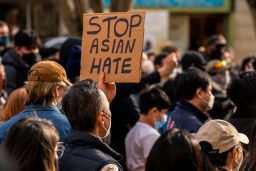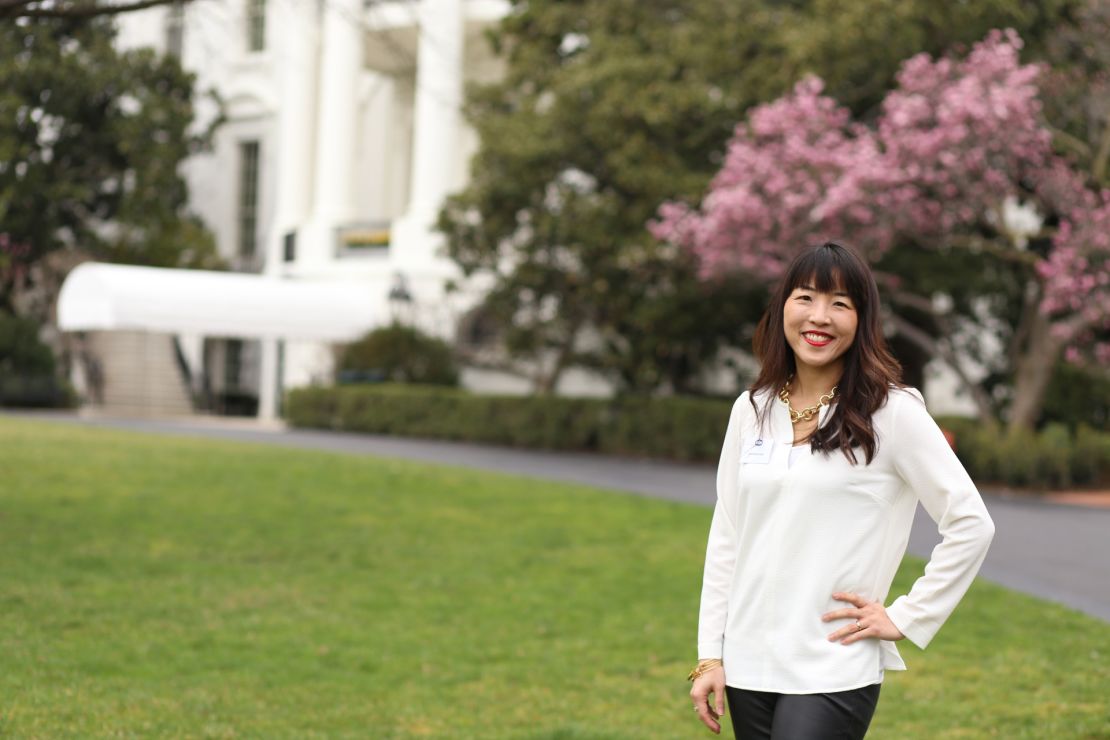I was out for a walk with my mom in an affluent, picturesque Boston suburb when I was 7 years old when I suddenly heard yelling and felt something hard hit me on the back of the head.
Cold, sticky liquid ran down my back and pain pulsed where the object had landed. I looked up in confusion as a group of teenage boys cruised past us, hanging out their car windows screaming, “Take that, ch*nks!”

Yes, human beings jeered and threw full soda cans at a mother and child from the cowardly position of a moving car. It was a formative moment – and the beginning of my realization of how different I was and always would be.
That violent moment crystallized the default “watch your back” stance I have carried into adulthood. It’s exhausting, but racial aggressions happen frequently enough – weekly was not uncommon pre-pandemic when I was out in the world regularly – that it only makes sense to protect myself.
Then came the pandemic. Even though I have approached unfamiliar interactions bracing myself for racism since that day, I found myself deeply anxious in the face of Covid-19-related racism toward Asian Americans at the beginning of the pandemic. My anxiety shot up even further as reports of racism and discrimination against Asian Americans were quantified, including the recent shootings in Atlanta.
The work of dealing with racial aggressions is even more fraught because I’m a parent. When my kids were babies, the aggressions were mostly of the annoying, clichéd, but not threatening variety – “Are you the nanny?”
After the 2016 election of former President Donald Trump, there have been times when I felt like a liability to my family. In those moments, I have found myself both furious and strangely in awe as I recalled how my mom straightened her shoulders, tried to shake the soda off my clothes, and ushered us home after we were attacked.

What can parents do right now? How can Asian parents address their kids’ reasonable mental anguish and calm their fears? And how can non-Asian parents raise compassionate kids who embrace a world that is becoming ever more diverse?
Look for small everyday moments to foster empathy
Finding simple things in common with other people can be a powerful way to help kids develop empathy for people who look different from them. Making Caring Common offers approachable empathy activities. The project’s “just like me” activity encourages a simple language tweak: “Encourage kids to look for things they have in common with other people. … For example, if your child says, ‘He likes to go down the slide,’ encourage them to say, ‘He likes to go down the slide — just like me.’”
Let your kid take the lead
Many parents feel like they need to explain everything, but it’s just as important to sit back and listen. Try to listen first — find out what they may have seen or heard. If they seem anxious or distressed, make space for their feelings,” recommends Michelle Woo, author of the forthcoming book “Horizontal Parenting.”
Woo recommends encouraging kids with prompts to foster emotional fluency and connection: “You can say, ‘Sharing our feelings is a way to feel strong.’ If they tell you they’re feeling angry or confused, you can tell them that you are, too.”
Be mindful of your tech use, and unplug if necessary
Right about now is prime time for doomscrolling, which means it’s even more important to put attention and awareness on your tech consumption.
“It can feel very scary to parent when there are instances of violence and hate that affect our kids, our families, and our communities,” said TechSavvyMama.com founder Leticia Barr. “While we may want to consume news to learn more about what’s going on, it’s important to unplug.”
Barr, a middle school teacher based in the Washington metro area, recommends an extra level of mindfulness toward media consumption habits. “Know when to turn off the television even if you like to have it on in the background. Be mindful of the podcasts you might be listening to on the smart speakers in your home. Recognize when you’re doom scrolling social media on your laptop or phone and step away,” she said via email.
Expand your family’s perspective
Books are a fantastic way to expose kids to diverse storytelling while also helping them see commonalities (per the aforementioned “just like me” empathy exercise), and also to expand adult perspective. “Eyes That Kiss in the Corners” by Joanna Ho and Dung Ho is a wonderful recently published picture book for kids.
For adults, Cathy Park Hong’s “Minor Feelings: An Asian American Reckoning” provides an incredible lens into the Asian American experience. “Caste: The Origins of Our Discontents” by Isabel Wilkerson changed my perspective and understanding of the upper and lower caste systems in America, as well as my position in the middle caste.
Model the behavior you want to see
Acting as we want our kids to act is a huge part of parenting. This concept applies to everyday human interactions as well as technology consumption.
“Our kids notice what we’re doing even when we think they’re not paying attention,” Barr said. “Be mindful since our actions can have a negative effect on them by increasing their anxiety.”
Show your allyship by centering others
When terrible things happen, it’s common to respond by centering yourself in the conversation (e.g., “This is a terrible thing that happened but I’m a good person”). Part of being an ally means resisting that urge to center yourself; instead, tend to the feelings of the person who is suffering and elevate other people.
Remind your kids – and yourself – how important it is to be a good listener. Show your allyship by standing up for and supporting people, whether that means calling out racial aggressions or elevating the work of diverse voices (check out @ohhappydani, @shirien.creates, @theconsciouskid on Instagram).
Keep the conversations going
Racism has deep, ugly roots in the United States, and we need to keep talking about it. Keep the conversations going through everyday touchpoints with your kids. The touchpoints can be positive – such as learning about different cultures through books, food and field trips to historic sites, to name just a few – as well as more challenging (e.g., driven by the news).
“What’s important is to make sure this conversation is ongoing, and not one that only happens when we see something tragic in the news,” Woo said.
Get CNN Health's weekly newsletter
Sign up here to get The Results Are In with Dr. Sanjay Gupta every Tuesday from the CNN Health team.
The work of dismantling racial discrimination is going to take time, effort and a lot of discomfort. But one shining hope I feel right now — as I look at the loving messages I have received since the Atlanta shooting news broke — is that the world has evolved in the 40 years since I felt the cold, lonely sting of racism on that walk with my mom.
I will continue to watch my back, but now I know that other people have my back, too.
Christine Koh is a former music and brain scientist turned author, podcaster, and creative director. You can find her work at christinekoh.com and on Instagram, Twitter, and Facebook at @drchristinekoh.








